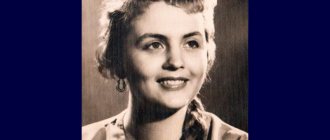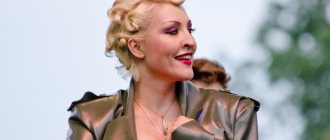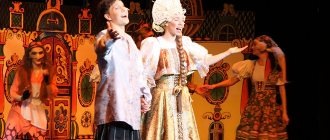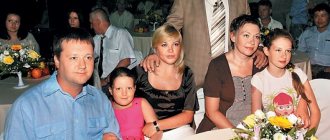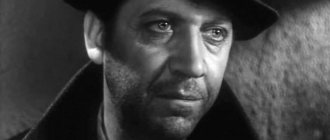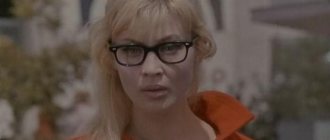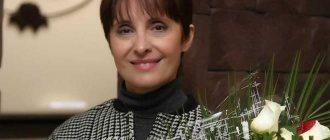Biography of Varvara Vizbor
Varvara Vizbor is a Russian singer, the granddaughter of the sixties bard Yuri Vizbor. Her favorite genres are jazz and lounge, but she also enjoys reworking her grandfather's songs, adding personality and a new sound. Together with rapper L'One, she recorded the song “Echo of Love” from the soundtrack to the second season of the TV series “Chernobyl. Exclusion Zone".
Actress and singer Varvara Vizbor
Childhood and adolescence
A native Muscovite, Varvara Sergeevna Vizbor was born on February 18, 1986 into a creative, intelligent family. Varvara’s grandfather is the famous poet-bard Yuri Vizbor, her grandmother is the talented poet and writer Ariadna Yakusheva.
Varvara Vizbor in childhood
Unfortunately, the girl was born a year after her grandfather’s death, but she became acquainted with his work in early childhood. His parents bought a collection disc containing his song “Night Road,” which sank into Varya’s soul from the first chords. How surprised she was when her mother told her that this was her grandfather’s song!
Since childhood, the girl was surrounded by a creative atmosphere, which could not but influence her worldview and future destiny. Representatives of the capital's bohemians often gathered in the house, sang, played music, read poetry and staged impromptu performances. Her parents instilled in her a kind attitude towards people and the ability to communicate freely with a variety of people, and from her grandmother Varya inherited a sense of humor and an optimistic attitude towards life.
Yuri Vizbor - grandfather of Varvara Vizbor
The girl’s parents, Tatyana Vizbor and Sergei Lobikov, also people of creative professions, immediately recognized their daughter’s artistic and musical abilities and took her to a theater studio. Having become a first-grader, Varvara enrolled in the school choir “Red Carnation”, in which she sang until graduation.
Photo shoot of Varvara Vizbor for Vogue
She was an average student and preferred to spend her free time not with textbooks, but at choir rehearsals or in the children's theater. With his brother Yuri, they often organized home concerts: Yura played, and Varya performed songs from the repertoire of her beloved Alla Pugacheva. The girl also practiced drawing and macrame.
After graduating from school, Varya tried to enter VGIK, but did not pass the competition. Failure did not dampen the ardor of the ambitious girl, and on the advice of Alexei Batalov, a year later she applied to the Shchukin School. This time her efforts were rewarded: Varvara became a student at a prestigious theater university, which she successfully graduated in 2007.
Varvara Vizbor is very similar to her grandmother Ada Yakusheva
Biography Singer Varvara
Varvara's appearance on the Russian stage marks a new era in the development of the Russian popular music industry. The songs she sings exist outside of the traditional “rock” or “pop” formats, because her music is a subtle fusion of almost all world musical traditions. Alternative and symphonic music, ethnicity of northern Europe and the East, electronics and new age, seasoned with a current sound - according to Varvara, these elements should make up modern popular music. In this quest to find the ideal form of pop music that would sound organically in any language in any country in the world, Varvara is truly the closest to the style-changing Madonna. And in this sense, Varvara is a stranger among her colleagues on the pop scene. One of Madonna's critics recently described the style of her latest album, Music, as "romantic techno-rock dance." It is well known that Madonna is a recognized experimenter in the field of modern music. Varvara's musical experiments can lead to the fact that we will finally have high-quality popular music with which we are not ashamed to enter the world music markets. Varvara does not like to play with definitions, but for those who like to put “excise stamps” and “varvaros”, or, more precisely, “barbaros” on the sound and voice, in Greek means a meaningless and completely untranslatable set of sounds. barbarians those who did not know their language. Initially, the concept of “barbarian” did not have any negative meaning. Only much later, in the 5th century BC, during the Greco-Persian wars, did the Greeks develop a theory of the spiritual inferiority of non-speaking people, and the term acquired a different meaning. The Romans considered those peoples who did not live “by the rules”, that is, not observing the laws, to be barbaric. During the era of the collapse of the Roman Empire, many barbarians began to convert to Christianity and, by mistake, at baptism received the name Barbarian or Barbara, in the female version - Varvara or Barbara. One of these Barbarians was destined to die for her faith, and for her earthly deeds she was subsequently canonized. They began to name girls in her honor - after the saint.
I. The Beginning “Margo stood away from them, from all these guys who only knew that it was always raining, raining, raining. They were all nine years old. And if there was a day seven years ago when the sun finally came out and appeared for an hour to the astonished world, they did not remember it. Sometimes at night Margot heard them tossing and turning, remembering, and she knew: in their dreams they see and remember gold, a bright yellow pencil, a coin so gold that it could buy the whole world.” Ray Bradbury, "All Summer in a Day"
Varvara Varvara is her childhood, which was densely packed with events that contributed to the development of the future star . It’s hard to believe, but once upon a time this luxurious blonde with the appearance of a fashion model was embarrassed by her appearance and behaved like a “gray mouse” among her peers. A girl from Balashikha, from an ordinary family of engineers, simply did not like to study, but, of course, she was forced to. And today, sometimes Varvara , sighing, says: “I didn’t have a childhood.” However, some things evoke nostalgic memories for her - for example, music school in the accordion class, although she graduated from it “with a C to a D, from a D to a C.” Or the accordion given by the grandfather to four-year-old Varvara: although it has long been worn out, and many of the valves on it do not work, the singer carefully keeps this gift.
With pleasure, Varvara was only involved in dancing and sports, so at school she was responsible for organizing all evenings and matinees, being the head. cultural sector. Surprisingly, she showed almost no interest in solo singing and even almost entered the Institute of Light Industry. Fortunately, she was stopped by one fateful event. Once in the House of Culture, where Varvara was dancing, she walked past a door from behind which crazy guitar blasts like AC/DC could usually be heard. But, having heard Paganini’s virtuoso variation instead of hard rock, Varvara listened and was truly glued to the door. The further development of events was comical: the door opened and the girl literally burst into the room. But the insightful guys did not laugh: they instinctively felt that behind this impulse there was something serious, and gave Varvara an instant audition.
The next day she did not go to the institute for courses, but went to a rehearsal with the ensemble. A few days later, the group unanimously decided that Varvara had an individual, strong voice - and something needed to be done about it. A month before the start of entrance exams to universities, together with a choir teacher at the same recreation center, Varvara prepared a mini-program... And she entered the Gnessin School with a competition of 12 people per place - based on the results of the first round. Varvara owed this success To this man, who once became famous for the scandalous production of “The Threepenny Opera” in Odessa, she owes the nickname “Verst Kolomenskaya” - that’s what the professor called Varvara when he was especially dissatisfied with her. Despite the fact that the relationship with the teacher was difficult - he repeatedly kicked out the artist and even threw shoes at her - Varvara invariably returned and persistently continued to study with the eccentric genius. In Gnesinka’s last year, quarrels with teachers became constant: they tried to convince the girl that “the operetta was crying for her,” and Varvara explained that she only agreed to free flight. And after graduating from college, throwing aside all prejudices, I went to sing “in a tavern.” The very first performance turned out to be a disaster: “Some uneven sobs poured out of the microphone. I thought: why the hell did I even finish anything... But after a few months I learned to get rid of the acquired syndrome of “dome” singing, which is characteristic of all classical singers: my voice became more flexible, and I went into a frenzy.”
After some time, Varvara unexpectedly found herself in the troupe of the State Theater of Variety Performances, headed by the master of the national stage, Lev Leshchenko. At the same time, the singer graduated from GITIS with a degree in pop artist. For several years she has been tirelessly touring with the theater as a soloist - and performing Soviet pop classics. It got to the point that during a tour of US cities, Varvara often woke up in the middle of the night and walked around the room like a sleepwalker, repeating songs from the program. But it was then that she had the opportunity to perform her own songs as part of large theater concerts. Soon Varvara felt cramped in the theater, and she took off on a free flight.
III. Varvara Varvara In 2001, she released the artist’s debut album, which was called “ Varvara ”. Work on this record continued throughout 2000. Most of the songs were written by unknown young authors, and only the name of Kim Breitburg - the main songwriter of Boris Moiseev - spoke something to the listeners. Young multi-instrumentalists took part in the recording of the album, united in one group named after Varvara. It was then that for the first time the DJs of the leading radio stations began to think: what style should this music be classified as? There are echoes of all musical cultures - from Russian to Arab; the sounds of live instruments are combined here with electronic samples, tragic compositions invariably coexist with 100% danceable pop hits, and at the same time - scary to think - poetry comes to the fore! The songs of the debut album, despite their unformatted nature, were a success with listeners: the title song “ Varvara ,” “Butterfly,” “On the Edge” and “Fly to the Light” truly bathed in the airwaves. But the fact that in Nicole Claro’s book “Madonna” one of the chapters was called “On the Edge” went unnoticed - such subtle moments always pass by the attention of listeners.
Varvara’s first album turned out to be as controversial as the singer’s on-screen image. Exquisitely beautiful and incredibly sexy, a charming modest woman and a lonely wanderer - this whole series of images was simultaneously presented by Varvara in three video clips shot for the first album. The first video for the song “Fly to the Light,” directed by Varvara’s long-time friend Fyodor Bondarchuk and cinematographed by Vlad Opelyants, turned out to be a harsh experiment in its genre. It was filmed at a factory, and Varvara , at a temperature of minus 5 degrees, had to pretend to be “mischievous” in a light T-shirt. The next one - “Butterfly” (dir. D. Makhamutdinov) - was filmed in Egypt, in radically opposite conditions. “I wanted to make a video in the form of a mini-film. The plot is as follows: while on vacation in Egypt, I find a bracelet with a butterfly that once belonged to Cleopatra. And the queen’s soul moves into my body. I live her life: love with Caesar, war with the Romans, death from a snake bite. Especially for filming, we went to Egypt to the ancient city of Luxor. The temperature went over 70 degrees, the stones began to melt... I literally almost killed myself - it was so hot. But, immersing yourself in the atmosphere of the famous “garden of columns”, the alley of sphinxes, the temple erected thousands of years ago by the mysterious Queen Hatshepsut, you inevitably begin to understand the very essence of Ancient Egypt.” The third video, “On the Edge,” did not involve any extreme situations, but was entirely based on the conceptual idea of director Sergei Kalvarsky. According to the idea of the video, behind the visual metaphors of a snake and a dagger lies the relationship between a man and a woman who has already been burned in life, but has finally met the embodiment of her ideal. The filming of “Butterfly” was preceded by another unexpected event in Varvara’s life - in 2000 she won the Grand Prix at the “Kinodiva” competition. The competition, held as part of the Kinotavr festival, was not so much a beauty contest as an acting competition.
Young film and theater actresses, as well as pop singers, acted out sketches, danced minuets and, according to the well-known scenario, played Tsarina Catherine in Tsaritsyn Park. “I was not interested in participating in this show. At that moment I was a product of the producer’s extravagance. The only funny moment was how Vyacheslav Dobrynin and I portrayed Little Red Riding Hood and the Gray Wolf. Moreover, Dobrynin completely refused to use the proposed text and improvised with all his might: “Don’t rub salt on my wounds,” and so on. In fact, it’s much more pleasant for me to remember another competition - “Show Queen”, where I took a well-deserved second place.” Throughout 2000 and 2001, Varvara did not stop her concert activities - except for a short break that occurred during the birth and upbringing of the singer’s daughter, who also received the name Varvara . For some time, the singer lived in her beloved United Arab Emirates - and also gave concerts there with a program of ten songs in Arabic. The singer’s Scandinavian appearance, coupled with her deep, flexible oriental voice, made such an impression on the Arabs that Varvara was offered to record an “Arab album.” Someday his time will come...
IV. “Closer” by Varvara The first album became a kind of test of strength for Varvara. Music critics, confused by the fact that there were no analogues to Varvara’s music on the Russian stage, tried to put her on a par with the exalted Linda and the magnificent Valeria. “I will always be against drawing any analogies between my work and what pop artists do in Russia. They exist in their own field, artificially created twenty years ago, and are afraid of any infusions from the outside. Pop music in Russia may not change for another twenty years if we do not catch the wave that is sweeping throughout the world today. Pop music of a particular country is not interesting if it does not contain elements of all other music, if it does not become world-pop music. I can draw the best analogy for my music myself: Mylène Farmer, who in France also cannot be classified as either traditional rock, “pop,” or, especially, chanson. This is what definitions are all about.
But if after this phrase they start comparing me with Mylene Farmer, this will be the greatest stupidity of the comparison.” Thinking about recording a second album, Varvara once again looked in the “mirror” of the first. And she appreciated all his shortcomings: he is too slippery in terms of style, uneven in emotion, and “flirts” too much with the public. Shaking a lock of blond hair, Varvara decided that it was time to do what had always been closer to her. Once again I listened to my favorite records: Enya, Madonna, Garbage, Shania Twain, Sheryl Crow... And went to work for almost two years. Most of the compositions were written at the Brothers Grimm studio - it was this company that managed to find arrangements and sound that were adequate to the singer’s ideas. The first material recorded by Arthur A'Kim and Dmitry Moss turned out to be so fresh that the question of defining the style began to sound in a new way. It was at that moment that Varvara received an offer from the founder of the famous Swedish studio Cosmo, Norn Bjorn, to record several compositions with the Swedish symphony orchestra. This unique opportunity - to hear yourself in the “Euro-processing” of sound producers who worked on the latest records by A-ha and Britney Spears - was impossible to miss. Collaboration with the Swedes resulted in the song “It’s Behind,” in the style of fashionable r’n’b, but Varvara decided to continue recording other songs for the future album in Russia. “We had the opportunity to compare. I used it. Varvara
The ideas of the Brothers Grimm studio turned out to be closer to me, and the sound they achieved was fully consistent with the European level.” In the summer of 2002, Varvara’s song “I’m Alive” unexpectedly sounded on Our Radio on the air of the program “Do you need it?” This had the effect of a bomb exploding - until that moment, the so-called “pop performers” had not appeared on Our Radio. Legend has it that the song was chosen personally by Mikhail Kozyrev. However, contrary to all expectations, listeners of the country’s main “rock’n’roll” radio station did not succumb to provocation and refrained from castigating Varvara, who was presented by the host as a pop singer. 30% of the audience who took part in the online voting bombarded the Nashe Radio forum with indignant messages about the host’s incorrect actions and demanded satisfaction. This experiment was another confirmation that Varvara’s work lies “on the border” between pop and rock music. The compositions “I’m Alive”, “Heart, Don’t Cry” and “You Can and You Can’t” were released in the summer as a separate single, which instantly spread across radio stations. Soon, Varvara’s industrial-aesthetic video “Heart, Don’t Cry” appeared on the air of leading music TV channels. It became the first video work in which Varvara tried to realize her idea of timeless videos, where everything rests on acting. A little later, a video for the song “Od-na” appeared, filmed in an abandoned workshop of the ZIL plant among fuel oil puddles and construction waste. On November 30, Varvara appeared on the stage of the Kremlin Palace of Congresses: she performed in the final of “Song of the Year” with the composition “One-on”. Behind the scenes, aggressive journalists tried to pester the singer with questions - however, Lev Leshchenko, who represented Varvara, did not allow the process to go beyond normal. In December 2002, the singer recorded the last composition, which gave the final name to the album - “Closer”. “This album is a rethinking of everything that happened to me before, a reflection on the past. After him I will go forward, and you must be ready for this.”
“One-on” (dir. Dmitry Zakharov) The plot of this video is based on the fantastic story by Ray Bradbury “All Summer in One Day.” This sad story is about one day of children living on a planet where the sun appears once every seven years. The rest of the time it rains forever, and the world is plunged into endless twilight. Only one main character still remembers what the sun looks like. This is why the children punish her. They lock her in the barn exactly at the moment when the sun appears... We filmed the video together with Dmitry Zakharov and Max Osadchiy in an abandoned workshop of the ZIL plant. Professional actors and fashion models did not participate in the filming. I wanted to involve only those people who really like my work. Therefore, only those who sent me their photographs to the site and expressed a desire to participate in the shooting were invited to participate in the video.
Varvara about songs from the album “Closer”
Varvara “Heart, don’t cry” - The mood of this song is best reflected in the video. It's about a city of the future, about a girl, unearthly and distantly cold. There, in the future, people are accustomed to restraining their feelings. But love and sensuality live in a girl’s heart. This is what she sings about.
“One-on-one” - The question immediately arises: why? It’s just that if you forget about the present, about today’s prosperous life with your family, and go into the past, then you are left alone with what you have lived. There were moments when it was very difficult: bread, water, a child, a mother. It was very bad. Of all the songs on the album, this one is closest to me.
“It’s possible and it’s not possible” - “Adult” song. In my opinion, including it in the album is a rather risky decision. She breaks it down a bit. There is such sausage, joke, irony...
“Two Sides of the Moon” - Unfortunately, they don’t want to take this thing anywhere. Everyone really likes it, everyone says it’s a super product, but they can’t take it: it’s not in format. I think that the Norman notes with which the song is saturated are to blame. I love Enya very much. I absolutely love Irish melodies. In general, I am drawn to northern ethnicity. I am in love with medieval and Renaissance Europe. When I come to France, wander through the castles of the 16th century, I feel the Norman spirit preserved within these walls. I get the feeling that I lived there: I stroke the walls, and I want to shoot videos there. I understand that we can’t push such a product anywhere, but I still continue to record such songs.
“Nowhere to Run” - This song was the most difficult for me. I'm not such a depressed person. However, here I used all my temperament and achieved considerable emotionality - but the song is still cold. After it, for some reason they began to compare me with “TaTu”, and this upset me a little.
“I’m alive” - It was in this composition that my “snow-covered volcano” awakened. It is brilliantly arranged. When she was put at the mercy of the program “Do you need it?” on “Our Radio”, I was neither hurt nor scared. People simply did not understand how to react to this trick. And I was always interested in knowing the opinion of this audience. The song earned 30 percent sympathy, which means that I am still a little close to the listeners of Our Radio.
“Homeless Children” - Well, this song is actually about me! I have always been carried along like the north wind: both in love and in life. I only stopped when my daughter was born. On the program “I am a mother,” I was once asked how I can communicate with my children on equal terms. Yes, I stopped going to discos only a year ago! And even then only because the husband swears. Nightlife has always attracted me with its energy...
“Music of Christmas” - The brightest thing on the album. Beautiful lyrics and wonderful melody. When you listen to it, it becomes incredibly easy. And everything really starts from scratch.
“Closer” is the title track of the record, that says it all. The second album is really closer to me than the first. “Closer” means I’m already halfway through my search for the perfect sound, the perfect word and the perfect method of communicating with the public. But the closer I get to my ideal, the more difficult it becomes.
https://www.varvara-fanclub.ru
Career
At first she wanted to take up teaching and entered the master's program, but soon she became bored with the stage and the audience and got a job at the School of Modern Play theater.
After serving there for two years, Vizbor moved to the Moscow Theater of Miniatures (Theatrium on Serpukhovka), where she was finally able to fully realize herself as an actress. But there was still an inner feeling of dissatisfaction, which disappeared when she took the microphone and began to sing. Varvara intuitively felt that being a singer was her true calling, and since 2013 she decided to devote herself entirely to her singing career.
Varvara Vizbor trained as an actress
While still a student, she began performing in clubs, where she met talented jazz musicians Sergei Khutas and Evgeniy Borets. Soon the guys organized their own group, “Vizbor VS Khutas,” which lasted five years. The group's repertoire consisted of original arrangements, intricately combining elements of jazz, blues, traditional Russian motifs and sacred music.
In 2020, their debut album “Strawberry” was released. Varvara recorded the subsequent collections “Magic Fruit”, “Mitten” and “Polyphony” under her own name. They included both original works created by modern authors, and songs of her legendary grandparents in new arrangements.
In the summer of 2020, Vizbor performed at the large jazz festival “Usadba Jazz”.
An excerpt characterizing Varvara (singer)
- You are not asleep? - No, I’ve been looking at you for a long time; I felt it when you came in. No one like you, but gives me that soft silence... that light. I just want to cry with joy. Natasha moved closer to him. Her face shone with rapturous joy. - Natasha, I love you too much. More than anything else. - And I? “She turned away for a moment. - Why too much? - she said. - Why too much?.. Well, what do you think, how do you feel in your soul, in your whole soul, will I be alive? What do you think? - I'm sure, I'm sure! – Natasha almost screamed, taking both his hands with a passionate movement. He paused. - How good it would be! - And, taking her hand, he kissed it. Natasha was happy and excited; and immediately she remembered that this was impossible, that he needed calm. “But you didn’t sleep,” she said, suppressing her joy. – Try to sleep... please. He released her hand, shaking it; she moved to the candle and sat down again in her previous position. She looked back at him twice, his eyes shining towards her. She gave herself a lesson on the stocking and told herself that she wouldn't look back until she finished it. Indeed, soon after that he closed his eyes and fell asleep. He did not sleep for long and suddenly woke up in a cold sweat. As he fell asleep, he kept thinking about the same thing he had been thinking about all the time - about life and death. And more about death. He felt closer to her. "Love? What is love? - he thought. – Love interferes with death. Love is life. Everything, everything that I understand, I understand only because I love. Everything is, everything exists only because I love. Everything is connected by one thing. Love is God, and to die means for me, a particle of love, to return to the common and eternal source.” These thoughts seemed comforting to him. But these were just thoughts. Something was missing in them, something was one-sided, personal, mental - it was not obvious. And there was the same anxiety and uncertainty. He fell asleep. He saw in a dream that he was lying in the same room in which he was actually lying, but that he was not wounded, but healthy. Many different faces, insignificant, indifferent, appear before Prince Andrei. He talks to them, argues about something unnecessary. They are getting ready to go somewhere. Prince Andrey vaguely remembers that all this is insignificant and that he has other, more important concerns, but continues to speak, surprising them, some empty, witty words. Little by little, imperceptibly, all these faces begin to disappear, and everything is replaced by one question about the closed door. He gets up and goes to the door to slide the bolt and lock it. Everything depends on whether he has time or not time to lock her. He walks, he hurries, his legs don’t move, and he knows that he won’t have time to lock the door, but still he painfully strains all his strength. And a painful fear seizes him. And this fear is the fear of death: it stands behind the door. But at the same time, as he powerlessly and awkwardly crawls towards the door, something terrible, on the other hand, is already, pressing, breaking into it. Something inhuman - death - is breaking at the door, and we must hold it back. He grabs the door, strains his last efforts - it is no longer possible to lock it - at least to hold it; but his strength is weak, clumsy, and, pressed by the terrible, the door opens and closes again. Once again it pressed from there. The last, supernatural efforts were in vain, and both halves opened silently. It has entered, and it is death. And Prince Andrei died. But at the same moment as he died, Prince Andrei remembered that he was sleeping, and at the same moment as he died, he, making an effort on himself, woke up. “Yes, it was death. I died - I woke up. Yes, death is awakening! - his soul suddenly brightened, and the veil that had hitherto hidden the unknown was lifted before his spiritual gaze. He felt a kind of liberation of the strength previously bound in him and that strange lightness that has not left him since then. When he woke up in a cold sweat and stirred on the sofa, Natasha came up to him and asked what was wrong with him. He did not answer her and, not understanding her, looked at her with a strange look. This was what happened to him two days before the arrival of Princess Marya. From that very day, as the doctor said, the debilitating fever took on a bad character, but Natasha was not interested in what the doctor said: she saw these terrible, more undoubted moral signs for her. From this day on, for Prince Andrei, along with awakening from sleep, awakening from life began. And in relation to the duration of life, it did not seem to him slower than awakening from sleep in relation to the duration of the dream. There was nothing scary or abrupt in this relatively slow awakening. His last days and hours passed as usual and simply. And Princess Marya and Natasha, who did not leave his side, felt it. They did not cry, did not shudder, and lately, feeling this themselves, they no longer walked after him (he was no longer there, he left them), but after the closest memory of him - his body. The feelings of both were so strong that the external, terrible side of death did not affect them, and they did not find it necessary to indulge their grief. They did not cry either in front of him or without him, but they never talked about him among themselves. They felt that they could not put into words what they understood. They both saw him sink deeper and deeper, slowly and calmly, away from them somewhere, and they both knew that this was how it should be and that it was good. He was confessed and given communion; everyone came to say goodbye to him. When their son was brought to him, he put his lips to him and turned away, not because he felt hard or sorry (Princess Marya and Natasha understood this), but only because he believed that this was all that was required of him; but when they told him to bless him, he did what was required and looked around, as if asking if anything else needed to be done. When the last convulsions of the body, abandoned by the spirit, took place, Princess Marya and Natasha were here. – Is it over?! - said Princess Marya, after his body had been lying motionless and cold in front of them for several minutes. Natasha came up, looked into the dead eyes and hurried to close them. She closed them and did not kiss them, but kissed what was her closest memory of him. “Where did he go? Where is he now?..” When the dressed, washed body lay in a coffin on the table, everyone came up to him to say goodbye, and everyone cried. Nikolushka cried from the painful bewilderment that tore his heart. The Countess and Sonya cried out of pity for Natasha and the fact that he was no more. The old count cried that soon, he felt, he would have to take the same terrible step. Natasha and Princess Marya were also crying now, but they were not crying from their personal grief; they wept from the reverent emotion that gripped their souls before the consciousness of the simple and solemn mystery of death that had taken place before them. The totality of causes of phenomena is inaccessible to the human mind. But the need to find reasons is embedded in the human soul. And the human mind, without delving into the innumerability and complexity of the conditions of phenomena, each of which separately can be represented as a cause, grabs the first, most understandable convergence and says: this is the cause. In historical events (where the object of observation is the actions of people), the most primitive convergence seems to be the will of the gods, then the will of those people who stand in the most prominent historical place - historical heroes. But one has only to delve into the essence of each historical event, that is, into the activities of the entire mass of people who participated in the event, to be convinced that the will of the historical hero not only does not guide the actions of the masses, but is itself constantly guided. It would seem that it is all the same to understand the significance of the historical event one way or another. But between the man who says that the peoples of the West went to the East because Napoleon wanted it, and the man who says that it happened because it had to happen, there is the same difference that existed between the people who argued that the earth stands firmly and the planets move around it, and those who said that they do not know what the earth rests on, but they know that there are laws governing the movement of it and other planets. There are no and cannot be reasons for a historical event, except for the only cause of all reasons. But there are laws that govern events, partly unknown, partly groped by us. The discovery of these laws is possible only when we completely renounce the search for causes in the will of one person, just as the discovery of the laws of planetary motion became possible only when people renounced the idea of \u200b\u200bthe affirmation of the earth. After the Battle of Borodino, the enemy’s occupation of Moscow and its burning, historians recognize the most important episode of the War of 1812 as the movement of the Russian army from the Ryazan to the Kaluga road and to the Tarutino camp - the so-called flank march behind Krasnaya Pakhra. Historians attribute the glory of this ingenious feat to various individuals and argue about who, in fact, it belongs to. Even foreign, even French historians recognize the genius of the Russian commanders when speaking about this flank march. But why military writers, and everyone after them, believe that this flank march is a very thoughtful invention of some one person, which saved Russia and destroyed Napoleon, is very difficult to understand. In the first place, it is difficult to understand wherein lies the profundity and genius of this movement; for in order to guess that the best position of the army (when it is not attacked) is where there is more food, it does not require much mental effort. And everyone, even a stupid thirteen-year-old boy, could easily guess that in 1812 the most advantageous position of the army, after the retreat from Moscow, was on the Kaluga road. So, it is impossible to understand, firstly, by what conclusions historians reach the point of seeing something profound in this maneuver. Secondly, it is even more difficult to understand exactly what historians see as the salvation of this maneuver for the Russians and its detrimental nature for the French; for this flank march, under other preceding, accompanying and subsequent circumstances, could have been disastrous for the Russians and salutary for the French army. If from the time this movement took place, the position of the Russian army began to improve, then it does not follow from this that this movement was the reason for this.
Varvarva Vizbor and The Voice Show
She chose one of Yuri Vizbor’s songs, “Winter,” to perform at the “blind auditions” in the fourth season of the show “The Voice” (2015). Oddly enough, despite the soulful performance and impeccable vocals, none of the four mentors turned to her.
Polina Gagarina admitted that she wanted to turn around, but the song “somehow ended quickly.” “Very nice, but there’s only one song, what happens next? It’s unclear what else you can show us,” said Alexander Gradsky. Basta and Grigory Leps also remained indifferent to Varvara’s performance.
Varvara Vizbor’s songs are loved by many TV viewers
The girl was upset, to put it mildly. But unexpectedly she received support from Voice viewers from different parts of the country. The situation that developed at the blind auditions caused bewilderment and dissatisfaction, because the audience was completely delighted with Varvara’s performance. The singer took the failure seriously, however, the love and support of fans of her talent, the number of which increased sharply after participating in “The Voice,” gave the artist the strength to believe in herself again.
